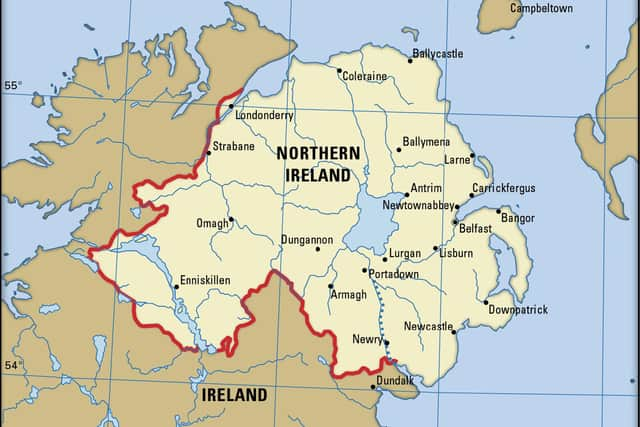Tory government rejects notion of 'consultation' with Dublin over how Northern Ireland is governed
and live on Freeview channel 276
Back in December, a cross-party collection of MPs produced a report about the Good Friday Agreement 25 years on, and how well – or otherwise – it could be said to be functioning.
It produced a battery of recommendations, and now the government has responded to those – effectively pouring cold water on them, and affirming that the Republic of Ireland can expect no input into the Province’s internal affairs.
Advertisement
Hide AdAdvertisement
Hide AdThe Northern Ireland Affairs Committee contains three Tories, one Labour MP, and one Independent, plus Carla Lockhart and Jim Shannon (DUP), Claire Hanna (SDLP), and Stephen Farry (Alliance) – although the two DUP MPs disagreed with the final report issued by the committee in December.


The committee's report had said that, since the "institutions are unstable and prone to collapse", a number of reforms should happen. It recommended:
Ditching the titles "First and Deputy First Minister" and replacing them with "Joint First Minister" by rewriting the 1998 Northern Ireland Act;
Ensuring the Speaker of the Northern Ireland Assembly is elected by MLAs on a supermajority of two-thirds (right now, a speaker is elected either by an outright majority of MLAs present, including a majority of unionists and nationalists, or 60% of MLAs present, including at least 40% from nationalist and unionist designations), also by rewriting the 1998 act;
Advertisement
Hide AdAdvertisement
Hide AdLaunching an "independently led review" of the agreement's institutions;
And setting up "a Northern Ireland Citizens’ Assembly" – basically like a big focus group of ordinary residents, which is meant to debate various hot topics and come up with recommendations (something which already happens in the Republic).
The committee's report said that changes should take place "in close consultation with the Government of Ireland".
This last line was one of the reasons why the DUP members of the committee dissented from its report.
Advertisement
Hide AdAdvertisement
Hide AdIn their own statement, issued separately to the report, the two MPs had stressed that "there can be no role for the Irish Government in the internal affairs of Northern Ireland".
Now the government's response to the above recommendations has been published in full.
It neither categorically endorses or rejects the notion of "citizens' assemblies".
However, the proposals to change how the speaker is elected, to create Joint First Ministers, and to launch a review of the 1998 Agreement, were met with a firm "no".
Advertisement
Hide AdAdvertisement
Hide Ad"Given the recent restoration of the Northern Ireland Executive, a review of the Agreement, or amendment of the Northern Ireland Act 1998 is not being considered at this time," said the government's response.
And on the subject of Dublin's role, it said: "We remain committed to upholding the long-established three-strand approach to Northern Ireland affairs, meaning that any reforms to the devolved, strand one, institutions are primarily for the Northern Ireland parties and the UK Government.
"We would, of course, also seek to ensure that the Irish Government were engaged in the event of substantive reform of the Agreement in line with established practice…
"[M]atters relating to the Strand One institutions are, and will remain, a matter for the UK Government along with the NI parties."